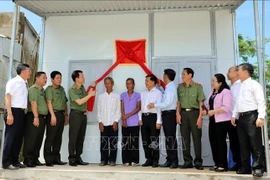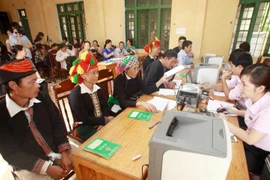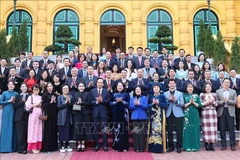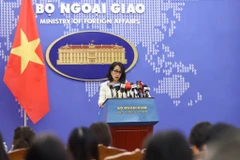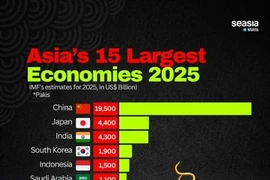Hanoi (VNA) - On behalf of the Party Central Committee’s Secretariat, its permanent member Tran Cam Tu on October 30 signed Directive No. 39-CT/TW on improving the effectiveness of social policy credit in the country’s new phase of development.
Accordingly, social policy credit has emerged as a "bright spot" and a "pillar" in the framework of poverty reduction and social welfare policies, addressing the aspirations of the people, particularly the poor and vulnerable groups in society.
Over the past decade, the implementation of Directive No. 40-CT/TW issued by the 11th Party Central Secretariat on November 22, 2014 to strengthen Party leadership in social policy credit has resulted in significant outcomes. Social policy credit has effectively contributed to socio-economic development programmes, accelerating sustainable poverty reduction, fostering rural development, creating jobs, enhancing human resources quality, and narrowing the wealth gap between regions. Furthermore, it has fostered national defence, security, and political stability, while reinforcing public trust in the Party and State.
Despite these achievements, the sector has faced several shortcomings, including insufficient and undiversified funding that has yet to adequately meet the real needs. Contributions from local entrusted funds, charitable donations, and other legal sources remain modest, accounting for a small proportion, while certain areas have struggled with low credit efficiency and high overdue debt rates. In addition, the Vietnam Bank for Social Policies (VBSP)’s digital transition process remains slow.
In light of the complicated and unpredictable impacts of traditional and non-traditional security threats, as well as Vietnam's ambitions to become an upper middle-income socialist nation by 2030 and a high-income country by 2045, there is a pressing need to enhance the efficiency of social policy credit mechanisms.

The Party Central Committee's Secretariat requested Party committees and administrations at all levels, front units, and socio-political organisations seriously implement a series of key tasks and measures.
First, they must thoroughly disseminate and rigorously carry out the Party’s policies and State laws on social policy credit, creating a shared understanding of its critical role.
Second, it is necessary to enhance these groups’ role in social policy credit, which should be identified as one of the key tasks in implementing the socio-economic development planning and strategies of units and localities, as well as the 10-year socio-economic development strategy for 2021-2030.
Third, policies and mechanisms related to social policy credit need improvements to ensure inclusiveness and sustainability.
Fourth, there is a need to prioritise the concentration of resources and diversify funding channels to implement social policy credit programmes, ensuring that the capital needed for operations is allocated within the medium-term and annual public investment plans for the VBSP. It is expected that by 2030, state budget allocations for the bank will account for 30% of the total capital. The establishment of mechanisms and policies enabling the bank to receive ODA funds and preferential loans from the government is also necessary.
Fifth, the VBSP must maintain its unique operational structure while refining governance, capital mobilisation, and financial mechanisms toward stability and sustainability.
Sixth, the tasks are to research specific mechanisms and policies to strongly encourage the social policy credit model, particularly the participation of communities, social enterprises, and non-profit organisations, and to promote the development of digital platforms for this type of credit and effectively control illegal lending practices./.

